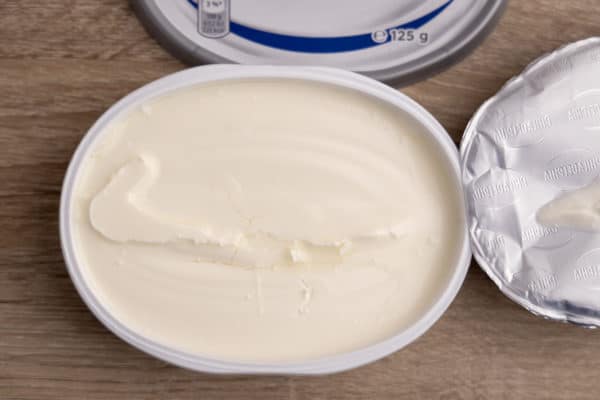How Long Can Cream Cheese Last Once Opened
Cream cheese is a staple breakfast item in many households, as well as a pretty common baking ingredient.
Of course, if you don't use it every day, you may find a package of cream cheese in the back of your refrigerator, and have no idea when you bought it, or if it's even still good to eat!
Can cream cheese go bad? How could you tell if cream cheese has spoiled? Read on to find out!

Can Cream Cheese Go Bad?
Like all dairy products, cream cheese can eventually go bad. Typically, softer cheeses will spoil faster than their harder counterparts because of the moisture content.
On average, unopened cream cheese will last for about two to three weeks past the expiration date. That's assuming that you keep it in the fridge, of course.
Once the cream cheese is opened, it will last for another week or two in the refrigerator before beginning to spoil.

Of course, the shelf life is highly dependent on processing methods.
Some containers of cream cheese are heat processed to remain fresh for up to six months in the refrigerator, and some packaged cream cheeses will even remain shelf-stable for months at a time before opening!
Before assuming your cream cheese has spoiled, it's worth checking the packaging to see if it has been processed for longer shelf life.
Unless cream cheese has been specially processed to be room temperature stable, you should refrigerate it to prevent harmful bacteria growth.

How To Tell If Cream Cheese Has Gone Bad
The main signs of spoiled cream cheese are changes in appearance, texture, or smell. If yours has any mold on it, it has dried out or completely separated, or gives off a sour or funny odor, it's time for it to go.
Let's discuss every one of those in more detail.
A quick visual assessment should usually tell you if cream cheese has spoiled. If there is mold growing on the cream cheese, this is a sign that it has gone bad, and should not be consumed.
While it's typically okay to simply remove the spots of mold from harder cheeses, this is not the case with softer cheeses like cream cheese (or cottage cheese).
Cheese molds can easily permeate soft cheese, so scooping out the mold from the surface and eating the rest is not an option.

Another sign of spoilage is that older cream cheese will dry out, becoming hard, waxy and yellowish in appearance. While it's not necessarily harmful to consume cheese that has dried out like this, it's certainly not pleasant.
You can cut off the dried-out part, and as long as the rest of the cheese looks and smells fine.
Cracks and separation can also indicate whether cream cheese has spoiled. Fresh cream cheese is smooth and uniform in appearance. As it ages, cream cheese will dry out, form cracks on the surface, and begin to separate.
If you notice large pools of liquid in your cream cheese, and a dried out surface, the cheese has definitely begun to spoil and should not be consumed.
A small amount of liquid on top of cream cheese is normal. It's natural and you don't need to worry about it (see the photo earlier in the article).
Smell is another good indicator of spoilage. Cream cheese will already smell a bit tangy, but if you notice a moldy, or sour smell, you should discard the dairy product.

Can You Freeze Cream Cheese?
Cream cheese can be frozen with some success. Because the texture will become crumbly, you should save previously frozen cream cheese for dishes where it will be cooked.
Once thawed, the cheese will likely no longer spread on a bagel, and may be slightly unpleasant tasting until heated thoroughly.

To freeze cream cheese, make sure you wrap it tightly so that no air may come in contact with the cheese. This is necessary to ensure that the cream cheese neither dries out nor takes on any flavors which may have collected in the refrigerator.
The freezer will dry out cream cheese over time. Because of that, it's best to freeze cream cheese for no more than a couple of months.
You can thaw cream cheese overnight in the refrigerator, and then use for cooking or baking.

Summary
- Always store cream cheese in the fridge
- Make sure the lid is closed, or use a plastic container if yours isn't resealable (e.g., it's in brick form)
- Unopened cream cheese keeps for a couple of weeks past its date, and lasts for about 7 to 14 days after opening
How Long Can Cream Cheese Last Once Opened
Source: https://www.canitgobad.net/can-cream-cheese-go-bad/